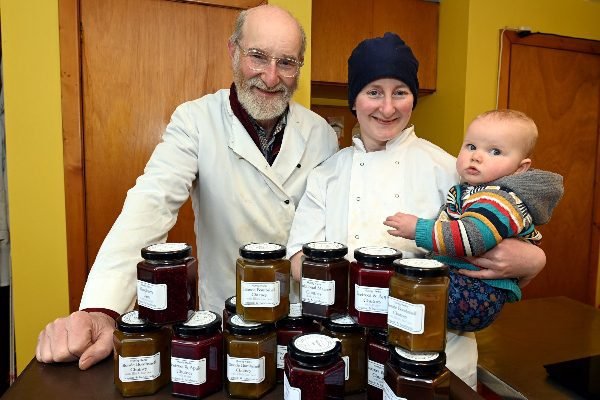This article first appeared in our ‘Why organic is the answer’ issue of My Green Pod Magazine, distributed with The Guardian on 03 September 2021. Click here to subscribe to our digital edition and get each issue delivered straight to your inbox
Whitestones was a mixed family farm with sheep, cattle, barley and silage for feeding the stock.
‘My Mum, Fiona, started Huntly Herbs as a diversification when my brother and I left home’, explains Anna Wilson, partner in Huntly Herbs. ‘She had an interest in herbs and was looking for a new project, I think.’
At the time organic herb growing was a niche enterprise; the gap in the market created a strong case for an organic herb business that chimed with Fiona’s own beliefs around growing.
‘My Mum had been researching food production, global agriculture and nutrition and was beginning to feel that organic was the way forward for a variety of environmental and health reasons’, Anna explains.
From herbs to preserves
The organic herb business flourished, but was in some ways a victim of its own success.
‘We kept having customers saying the sage plant we sold them was fantastic and still going strong five years later’, Anna tells us. ‘They had given cuttings to all their friends, which wasn’t ideal from a sales perspective!’
Preserve making presented an opportunity for an additional income stream; ‘jams and chutneys have a good shelf life compared with potted plants’, Anna explains, ‘and if people like them they come back for more.’
The preserves were originally intended to tide Huntly Herbs over through the winter, when the herb plants were out of season. Soon the chutneys in particular became more and more popular, presenting greater potential for expansion.
Organic growing and processing
Despite the shift in focus, organic production remains central to the business and Huntly Herbs is registered with the Soil Association as both an organic producer and an organic processor.
‘We wanted customers to know that we really are properly organic, not just ‘natural’ or ‘chemical free’ or any of the other slightly vague terms that are sometimes used’, Anna explains. ‘The Soil Association symbol is widely recognised by consumers and respected, too. Being Soil Association certified is a good discipline; it means we’re always striving to improve in terms of our impact on the environment – whether that’s our packaging or our growing techniques.’
The preserves have won lots of awards, the latest being the 2021 Soil Association BOOM Award in the Store Cupboard category. For Anna, the secret to success is always starting recipe development with flavour as the priority; ‘It sounds obvious’, she says, ‘but if you start out with costings it’s too easy to compromise on flavour.’
 Play Video about This Rock Might Just Save The World
Play Video about This Rock Might Just Save The World Play Video about Play 2 hours of rock
Play Video about Play 2 hours of rock Play Video about Play 2 hours of brook
Play Video about Play 2 hours of brook Play Video about Play 2 hours of sheep
Play Video about Play 2 hours of sheep











































